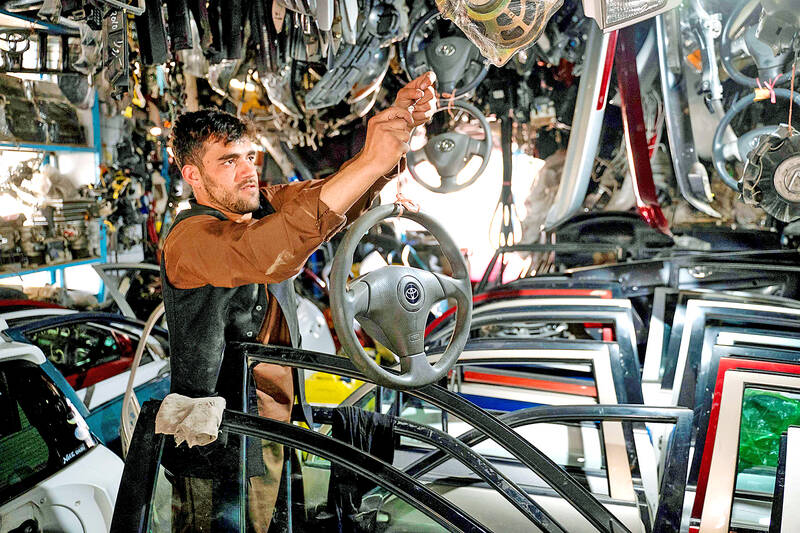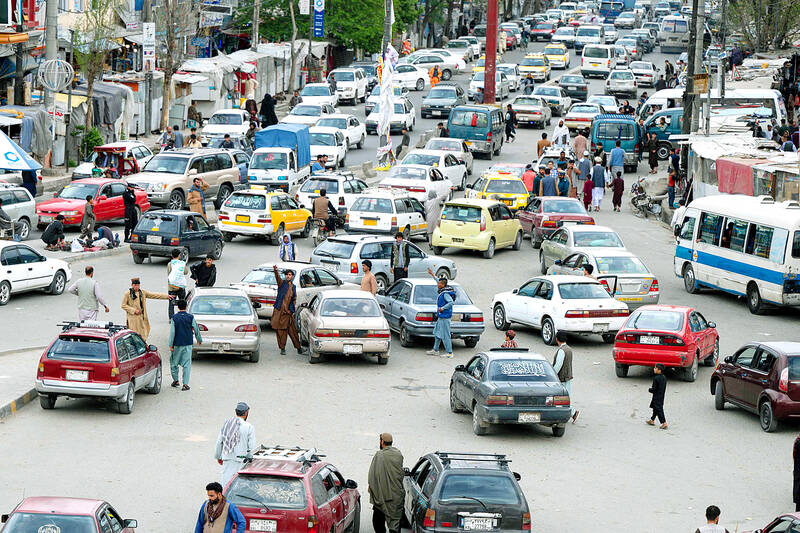Little is certain in Afghanistan — armies invade and retreat, governments rise and fall — but when the key of a Toyota Corolla turns in the ignition, the engine can be relied upon to roar to life.
A humble Japanese runabout with a reliable albeit unglamorous reputation, the Toyota Corolla is said to be the world’s most popular car, with more than 50 million trundling off production lines since 1966.
Sturdy, uncomplicated and affordable, it is finely tuned for a nation where roads dissolve into punishing terrain, repairs rely on frayed supply chains and a “make do” mentality has emerged from decades of hardship.

Photo: AFP
“These cars have always been there for people,” mechanic Mohammad Aman said. “If you travel with these cars, they can take you anywhere.”
“The Corolla is quick, their metal is bold, they work well,” the 50-year-old said.
Other cars “are flimsy like paper” by comparison, he added.

Photo: AFP
In Afghanistan, Corollas are virtually ubiquitous.
Fleets of the suburban mainstay sell on forecourts overlooked by rusted Soviet troop carriers. Corolla taxis with pummeled bodywork jounce past Humvees immobilized since US forces withdrew in 2021. Even hauling up a mountain in a 4X4 one might be overtaken by a careening Corolla driver.
Afghans everywhere emblazon their vehicles with English-language tributes romanticizing the brand: “Happiness is a Toyota feeling,” “Toyota sets the standard” and “Beautiful Corolla” have become the unofficial slogans of Kabul’s grinding traffic jams.
Corollas flooded Afghanistan after the withdrawal of Soviet forces in 1989 and the subsequent collapse of the Soviet Union, before which Moscow’s state-owned Lada brand dominated the market. They have had a background role in national history ever since.
When Washington launched airstrikes after the Sept. 11, 2001, attacks, Taliban founder Mullah Omar fled his Kandahar hideaway in a white Corolla.
It was buried in 2001, but triumphantly excavated last year “still in good condition,” a Taliban government spokesman said, adding that it should be publicly displayed as a “great historical monument.”
Over the Taliban’s 20-year insurgency, the Corolla became the vehicle of choice for car bombers.
Expendably cheap and camouflaged in plain sight, they were packed with explosives and rammed into targets with devastating effect.
Last year, after American forces had pulled out, Taliban authorities boasted about a new Afghan-designed sports car: a supposed symbol of progress.
Yet under its sleek, aerodynamic exterior were the mechanical innards of a modest Corolla.
Everywhere, sprawling families cram into the vehicle, with passengers far outnumbering seats.
“In other countries everything is used in the way it’s intended, but in Afghanistan people don’t care much about such standards,” auto dealer Azizullah Nazari said.
The 39-year-old has sold imported Corollas to suit any budget — US$1,500 to US$14,000 — and many seem to have taken a circuitous route to the country.
He points to a pristine white model apparently originating from Canada. Its interior is lined with South Korean newspapers and it has a Ghanaian number plate. Another has a bumper sticker from a US university; one more has the incongruous coat of arms of a district in central Germany.
Yet all of them have ended up in Afghanistan, where “people have a special craze for Toyota,” Nazar said.
Such is Afghans’ faith in the vehicle that the capital’s largest repair market is not served by paved roads. Shuhada-e Salehin is a jungle of interchangeable spare parts where Corollas are praised for their workaday dependability.
“Some people’s rides are simple, but some have a passion for making them fancy,” Aman said.
Begrimed with engine grease, his colleagues peer under the hood of an impossibly battered 1991 wagon — its paintwork cracked like a dry riverbed, the back wheel chocked with a stone, a peeling “fantastic Corolla” decal stuck to the window.
Out in Kabul’s afternoon traffic, 27-year-old cab driver Naqeebullah pilots a sun-bleached Corolla three years his senior as he scouts for fares.
He estimates 80 percent of vehicles on the road match his.
“All cars have failed to show results apart from the Toyota Corolla,” he said.
Swaying from his rearview mirror is a prayer card.
“Glorified be the one who has made this means of transport subservient to us,” it reads.

France cannot afford to ignore the third credit-rating reduction in less than a year, French Minister of Finance Roland Lescure said. “Three agencies have downgraded us and we can’t ignore this cloud,” he told Franceinfo on Saturday, speaking just hours after S&P lowered his country’s credit rating to “A+” from “AA-” in an unscheduled move. “Fundamentally, it’s an additional cloud to a weather forecast that was already pretty gray. It’s a call for lucidity and responsibility,” he said, adding that this is “a call to be serious.” The credit assessor’s move means France has lost its double-A rating at two of the

AI BOOST: Although Taiwan’s reliance on Chinese rare earth elements is limited, it could face indirect impacts from supply issues and price volatility, an economist said DBS Bank Ltd (星展銀行) has sharply raised its forecast for Taiwan’s economic growth this year to 5.6 percent, citing stronger-than-expected exports and investment linked to artificial intelligence (AI), as it said that the current momentum could peak soon. The acceleration of the global AI race has fueled a surge in Taiwan’s AI-related capital spending and exports of information and communications technology (ICT) products, which have been key drivers of growth this year. “We have revised our GDP forecast for Taiwan upward to 5.6 percent from 4 percent, an upgrade that mainly reflects stronger-than-expected AI-related exports and investment in the third

Mercuries Life Insurance Co (三商美邦人壽) shares surged to a seven-month high this week after local media reported that E.Sun Financial Holding Co (玉山金控) had outbid CTBC Financial Holding Co (中信金控) in the financially strained insurer’s ongoing sale process. Shares of the mid-sized life insurer climbed 5.8 percent this week to NT$6.72, extending a nearly 18 percent rally over the past month, as investors bet on the likelihood of an impending takeover. The final round of bidding closed on Thursday, marking a critical step in the 32-year-old insurer’s search for a buyer after years of struggling to meet capital adequacy requirements. Local media reports

RARE EARTHS: The call between the US Treasury Secretary and his Chinese counterpart came as Washington sought to rally G7 partners in response to China’s export controls China and the US on Saturday agreed to conduct another round of trade negotiations in the coming week, as the world’s two biggest economies seek to avoid another damaging tit-for-tat tariff battle. Beijing last week announced sweeping controls on the critical rare earths industry, prompting US President Donald Trump to threaten 100 percent tariffs on imports from China in retaliation. Trump had also threatened to cancel his expected meeting with Chinese President Xi Jinping (習近平) in South Korea later this month on the sidelines of the APEC summit. In the latest indication of efforts to resolve their dispute, Chinese state media reported that